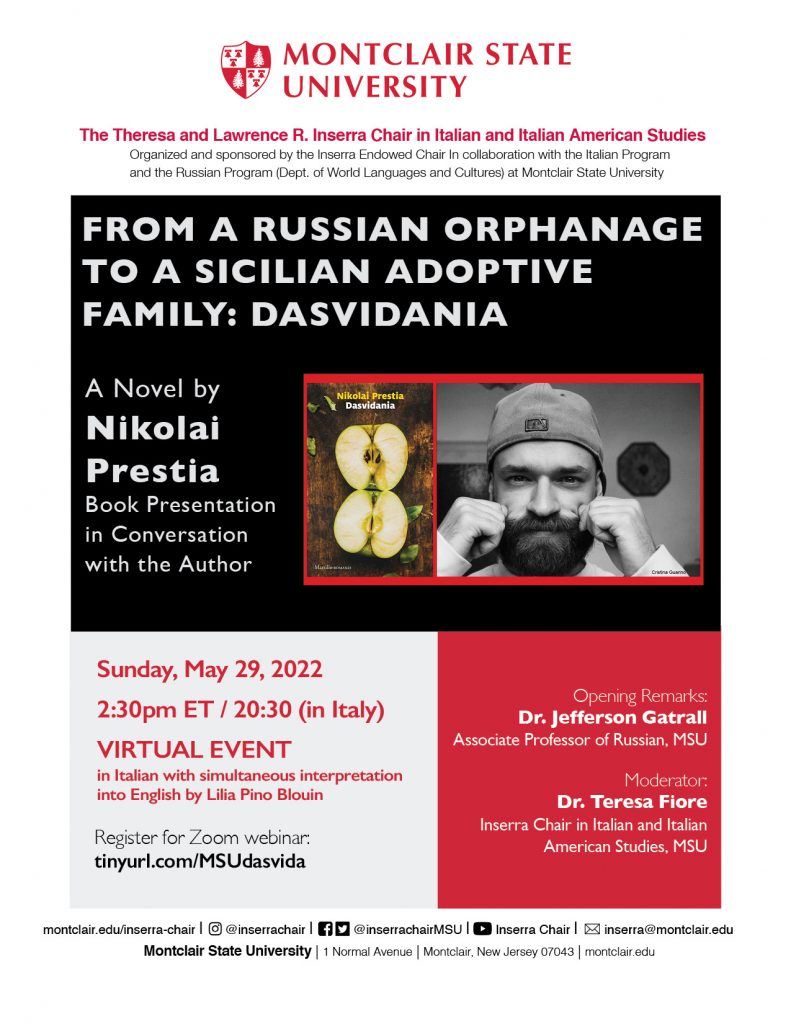From a Russian Orphanage to a Sicilian Adoptive Family: Dasvidania – A Book Presentation in Conversation with the Author Nikolai Prestia (May 29, 2022)
Posted in: CHSS News, Inserra Chair Events, Italian News and Events, World Languages and Cultures

“From a Russian Orphanage to a Sicilian Adoptive Family,” a presentation of the novel Dasvidania (2021, nominated for the Comisso Prize) in conversation with the author Nikolai Prestia, took place on May 29, 2022. The event was moderated by Dr. Teresa Fiore (Inserra Chair in Italian and Italian American Studies) with an introduction by Dr. Jeff Gatrall (Russian Program Director).
Dasvidania is an autobiographical book that sheds light on the experiences of a Russian boy grappling with the question of belonging, even before moving from Russia to Italy in the late 1990s. In it, Kola/Nikolai lucidly and inventively addresses the harrowing baggage of his family of origin, his hard and yet formative years in the orphanage system, and the exhilarating and also frightening prospect of moving to a new family, language and, ultimately, life.
As part of a brief but instructive journey into the figure of the orphan in some classic Russian novels, often reflecting the experience of Russian authors who were orphans themselves (Tolstoy, Dostoevsky), Dr. Gatrall highlighted some common narrative threads in works ranging from Boyhood to Crime and Punishment, Anna Karenina, The Brothers Karamazov, and The Idiot: the relentless longing for the mother; the economic struggles for those left to survive on their own; the ability of orphans to look at life from more than one perspective, to show acute sensibility, and to rely on imagination.
Image: I. Glazunova, “Sofya Ivanovna Karamazova before a Mother of God icon.” From Dostoevsky’s The Brothers Kazamazov (1880).
Interestingly, all these threads were addressed by the author of Dasvidania, as mechanisms that he has experienced, or that he portrayed in the novel. After a description of the content of the novel, he illustrated the people (a caring aunt; a loving nurse; the last orphanage’s director with his belief in education; his courageous adoptive parents) and spaces (orphanages, psychiatric hospitals, windows from which to stare at the world) that impacted the protagonist. The conversation with Prestia spanned from the genesis of the novel, which was strongly encouraged by film director Roberta Torre, to its actual publication, thanks to the support of such writers and series editors as Chiara Valerio.
The exchange between Dr. Fiore and Prestia also embraced the function of his novel. The book represents an important step in the author’s own documentation of a life that he felt compelled to remember and confront, including harsh experiences that he did not directly address in this conversation. The novel also constitutes a form of support provided to readers who are close to his experience, or who suffer from anxiety or depression due to trauma, or who are sensitive to the experience of pain. He relentlessly expresses the importance of excavating the past through creativity in order to design a future, despite the challenges they both entail.
Special attention was devoted to Prestia’s writing style, realistic and poetic at once, so reminiscent of post-WWII neo-realist films as well as terse Russian classics. Equally relevant was the analysis of the role of poetry and art in his creative process: he is strongly influenced by Charles Baudelaire, Vincent Van Gogh and René Magritte. “The Son of a Man” by Magritte (1964), with its enigmatic green apple at once covering and conveying a facial expression, is a very influential painting for Nikolai Prestia whose novel revolves around the presence and meaning of apples in his life experience both as carriers of pain and catalysts for renewal.
The event is the first of a series that will be presented on a regular basis in the future in order to bring attention to the multi-faceted topic of adoption within a particular framework reflecting the general focus of Inserra programs. Within this vision, trans-national adoption constitutes a complex form of migration at once geographical, cultural, and psycho-emotional, which contributes to a fluid and as such enriching perception of belonging and cultural identity.
The event was presented in Italian and English with simultaneous interpretation by Lilia Pino Blouin, and with Zoom technical assistance by Lydia Rosenberg. The excerpts from the novel were translated from Italian into English by Daniela Chaudhary Fiore.
For more information, see flyer below and webpage. See also the video of the event.




